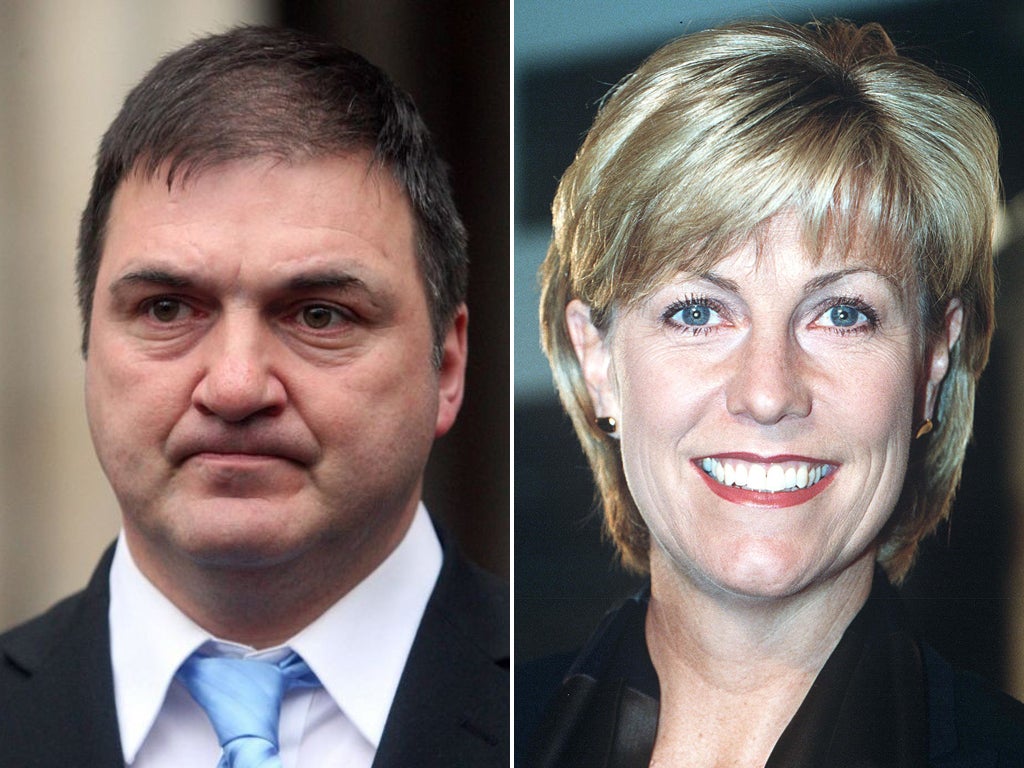Eight years in prison, but Barry George is refused compensation
High Court rejects claim for £500,000 as judges set new benchmark for miscarriages of justice

Barry George, who spent eight years in prison after being wrongly convicted of Jill Dando’s murder, had his claim for compensation thrown out yesterday after judges ruled that his conviction, later overturned in a retrial, did not amount to a “miscarriage of justice”.
Lawyers for the 52-year-old, who would gain up to £500,000 if his claim was successful, argued the Justice Secretary illegally withheld the payment after his conviction was quashed in 2007 by effectively suggesting that Mr George was “not innocent enough” to be compensated.
But a panel of High Court judges rejected the claim of Mr George and three other men whose convictions had been quashed. They were part of a test case to decide when a victim of a wrongful conviction can be declared innocent beyond all doubt, and therefore potentially entitled to a cash award.
One of the five claimants, Ian Lawless, who spent eight years in jail for a murder he did not commit, won his case and was granted permission to have his compensation claim reconsidered.
Nicholas Baird, the solicitor for Mr George, said he and his family were “terribly disappointed” at the finding and would continue their fight for redress from the Government.
Mr George, who has been diagnosed with Asperger’s syndrome, is seeking damages for lost earnings and wrongful imprisonment following his conviction of the murder in 1999 of Ms Dando, who was shot dead on the doorstep of her home in Fulham, west London. The Court of Appeal overturned the conviction after doubt was cast on crucial evidence of a “firearms discharge” particle found in a pocket of a coat worn by Mr George. When he was subsequently acquitted in a retrial, prosecutors said he had “the right to be regarded as innocent”.
The test case followed a landmark decision by the Supreme Court in 2011 which found that the “mere quashing” of a conviction could not be an automatic “trigger for compensation”.
The ruling by nine judges set a new test for a miscarriage of justice which required that damages should only be paid if a person could prove there were no circumstances that could have led to their conviction by a jury.
Yesterday’s ruling found that Mr George and three others whose convictions had been overturned failed to meet that test.
In a judgment which raises the question of a distinction in the judicial system between acquittal and a declaration of innocence, two High Court judges said there were no new facts in Mr George’s case which would have meant he could never have been convicted. Lord Justice Beatson and Mr Justice Irwin said: “There was indeed a case upon which a reasonable jury, properly directed, could have convicted the claimant of murder.”
The finding was greeted with dismay by Mr George’s legal team, who had argued the decision of the Government not to grant him compensation, which would have been capped at £500,000, was “flawed” and “contrary to natural justice”.
Mr Baird said his client was not yet giving up this fight.
He said: “We are very disappointed with the judgment and we shall be applying for permission to leapfrog the Court of Appeal to have the matter heard before the Supreme Court.”
Legal experts said the ruling was about “shutting down” the flow of compensation and was unfair on Mr George who is considered innocent of Ms Dando’s death in the public mind.
Michael Turner QC, chairman of the Criminal Bar Association, said : “What this is about is a change of the law making it harder for people who have suffered miscarriages of justice to get money out of the Government.
“It is about giving people in these cases the least amount of money and shutting down this stream of compensation. As far as Mr George is concerned this is not fair, because no one now thinks that he is guilty of this crime.”
Case winner: Unreliable evidence
Ian Lawless was jailed for life in 2002 after he told several people that he was involved in the murder of a retired sea captain on a Grimsby estate.
Mr Lawless was released in 2009 and his conviction was overturned after the Court of Appeal heard that his “confessions”, made to pub regulars and a taxi driver, arose from a mental condition that resulted in a “pathological need for attention”.
Despite a consensus among experts that his confession was unreliable and no jury could convict him on the basis of these admissions, the Justice Secretary refused an application by Mr Lawless to be compensated for his eight years of imprisonment. The High Court ruled yesterday that the Government had wrongly rejected the claim. The Ministry of Justice must now reconsider how much to award him.
Subscribe to Independent Premium to bookmark this article
Want to bookmark your favourite articles and stories to read or reference later? Start your Independent Premium subscription today.

Join our commenting forum
Join thought-provoking conversations, follow other Independent readers and see their replies